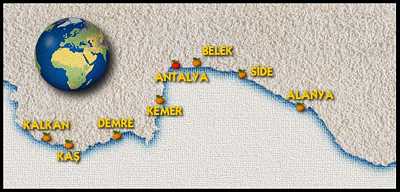![]()
Destination |
|||
Where are we on this planet?
About the area and the aimDemre area covers the land beginning from Beymelek fishery lagoon to Kekova Island is almost untouched because of the poor road condition and the curves of destination from/to Finike. The difficulties on transportation and announcing the region as protected land by state are the main reasons why the region remained untouched, not corrupted, not concreted and not crowded with its clean shores and sincere goodwill of its habitants. Unfortunately this situation is gradually changing and a flow of crowds will begin in the near future that government considers opening the area to tourism. The people domiciled here is Turcomen nomad origin and mixed with old native people of the town and some immigration flows of Turkish originated people of Greece. The residents are generally occupying farming business especially trading of green housing crops. The green houses are now scattered all over the area. Apart from farming, Demre has no other sources of business like industry, commercial activities etc. The educational level is also not so high. Scarcity of displaying the hand works, local cuisine and unrecognization the area and difficulties on cooperation among people are totally prevented the progression by comparing with neighbor towns.
In spite of hospitality and cool nature of inhabitants, inadequate information and creativeness along with mismanagement methods of local authorities are reason why Demre remained as it's unimproved position. While farming trade earns enough substantial matters, the human here never act to develop their conditions. But, as everything has a life cycle, these bright days will have an end eventually. People don't have preconceptions about what to do, but they gradually realize they have a problem and are eager to find new approaches and as communities especially the youths feel their way toward new patterns of growth and development, then there'll be much demand for tools and resources to guide changes—and a hunger for real-life examples of what works. This new tool for Demre, is tourism activity naturally by considering the potential of it. But for which cost to be suffered? We have experience enough on tourism corruption of one days' silent and lonely, pleasant and natural sea side villages. Unfortunately, the entire places covered by noise, corruption, pollution, concrete, crowds etc. at last. Because of sincere inhabitants of them worth money more than necessary and lost the all they have to the professional tourism investors just by witnessing how the nature and history are converted to money... What we are struggling on? We, want in dreaming to keep or preserve the natural and historical heritage while improving our way of life. The only way of this to get help of the human which share our feelings on preserving the last and the only natural place on these coasts. If we achieve this by getting human altogether before huge tourism investments commence, it will be perhaps the only sample of a tourism rescue operation against the common tourism understanding of present day. The potential features, we can manage to find are on the "Potential progression" page. We invite all the bodies, organizations, greens, environmentalists, enthusiastic people, idealists, artists, naturalists, researchers, discoverers, adventurers almost everybody just hearing our help screaming and sharing our anxiety, except ... -you know what I mean. If we can join and organize actions all together, before those tourism investments begin as concrete hotels, holiday villages, casinos, amusement centers so on and prior to the abolishment of land protection decision, we can manage to preserve the nature, authentic living of native people here, and stop the rapid loss of trees, wetlands, green houses, wildlife habitats, and open spaces and promote people here to run small businesses of their own as tea gardens, parks, playing grounds, lodgings, pension houses, fisherman restaurants, small bars etc hence stop selling out their natural beauties to investors. DTO will try to communicate, organize, projecting, supervise and direct the activities in a certainly collaborative manner as a non profit and non governmental civil society organization. We fixed up below activities but these are not the only ones surely. You may add yours to them.
Ecotourism. Can we achieve it with the actions to be done? We in Demre, as a coastal town have intented promoting ecotourism and nature-based tourism through the preparation of guides to ecotourism attractions and activities. The measures can be taken in association with marine and estuarine protected areas. However, for ecotourism activities to be sustainable, they must be managed properly and with special care. Unless properly managed, the impacts of ecotourism (for example, to remote pristine areas) may be worse than those of tourism to clearly defined and confined resorts. For example, concerns have been raised about the impacts of ecotourism on marine mammals, which already the loggerheads are in danger.
|
|||
|
 Demre is on the western Antalya region of south Turkey. If you tick
Demre is on the western Antalya region of south Turkey. If you tick 